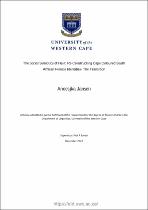| dc.contributor.advisor | Banda, Felix | |
| dc.contributor.author | Jansen, Anoesjka | |
| dc.date.accessioned | 2023-05-04T09:04:13Z | |
| dc.date.available | 2023-05-04T09:04:13Z | |
| dc.date.issued | 2022 | |
| dc.identifier.uri | http://hdl.handle.net/11394/9829 | |
| dc.description | Masters of Art | en_US |
| dc.description.abstract | Cape Coloured women have been misrepresented and misunderstood for generations as a result of apartheid and the deeply rooted ideologies at play during that time. The Coloured body was subjected to the colonial ideals of the time and these strained standards had adverse effects on the relationships these women had with their identity wrapped up in their hair. The aim of this study is to highlight the effects apartheid beauty norms had on their identity, to showcase the narrowed view of the media and their ill representation of Coloured women and their hair by providing Coloured women with an outlet to retell their hair stories of transitioning from the ridged colonial past into a decolonized present and future. Through the methodological approach of the Narrative inquiry, data was collected through interviews. Further data was collected via Media and Social Media platforms. | en_US |
| dc.language.iso | en | en_US |
| dc.publisher | University of the Western Cape | en_US |
| dc.subject | Identity | en_US |
| dc.subject | Women | en_US |
| dc.subject | Race | en_US |
| dc.subject | Culture | en_US |
| dc.subject | Decoloniality | en_US |
| dc.subject | South Africa | en_US |
| dc.title | The social semiotics of hair: Re-constructing cape coloured South African female identities- the transition | en_US |
| dc.rights.holder | University of the Western Cape | en_US |

